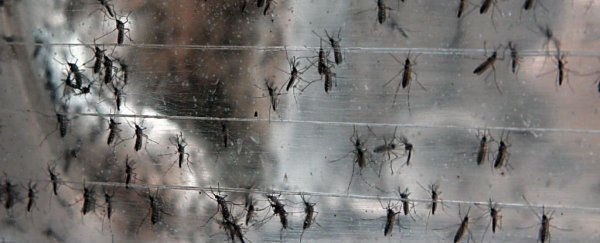The spread of Zika virus - a mosquito-borne virus that scientists strongly suspect is linked to serious birth defects - has gotten so bad, the World Health Organisation (WHO) has declared it a "public health emergency of international concern".
The WHO has only declared a public health emergency on three other occasions since the classification was established back in 2007 - one in 2009 during the H1N1 swine flu pandemic, and two in 2014 for polio and the Ebola outbreak. It says that without intervention, it's estimated that as many as 4 million people in the Americas will be at risk from Zika by the end of the year.
"I am declaring that recent cases of microcephaly and neurological abnormalities constitute a public health emergency of international concern," said director-general of the WHO, Margaret Chan, at a press conference in Geneva, Switzerland.
If you're infected with Zika virus, the best case scenario is that you'll see no side effects at all - which is the reality for about 80 percent of cases - and at worst, you'll have to deal with an itchy rash, fever, and conjunctivitis. But that's if you're not pregnant.
If you are pregnant when infected with Zika, you run a very high risk of your baby being born with microcephaly - a rare and devastating neurological disorder that causes newborns to develop abnormally small skulls and severe brain damage.
While an actual biological link has yet to be confirmed between Zika and microcephaly, WHO's 18-member advisory panel says the fact that a causal link is "strongly suspected", and considering the severity of cases that have already been reported, the designation of 'public health emergency' status was required.
Even if the link ends up being disproved later, says Chan, the consequences of hesitating are too great for the women and families that are being exposed. "Even the clusters of microcephaly alone are enough to declare a public health emergency because of its heavy burden [on the community]," Chan said. "Can you imagine if we don't do all this work now and wait till the science is settled, people will say why didn't we act."
On top of that, the WHO says there is serious concern about the lack of vaccinations or cures for Zika virus; the lack of quick and reliable diagnostic tests (made worse by the fact its extremely mild side effects mean many hosts don't even know they're sick); and the lack of any viral immunity in the population that's already been infected.
Plus: "A potential link to Zika is also suspected in adults who have been diagnosed with Guillain-Barré syndrome, a rare condition that can cause paralysis," reports The Washington Post.
How far has it spread?
A state of emergency was first declared in Brazil in early January, where at least 2,782 cases were reported in 2015, compared with just 147 in 2014 and 167 in 2013. Government health officials estimated that around 1.5 million locals have been infected with the virus since May 2015, and just yesterday they announced that the spread is probably worse than they initially thought.
Fast-forward to now, and the US Centres for Disease Control and Prevention has warned pregnant women to avoid travel to 25 countries and territories in the Americas where Zika has been reported, including Brazil, Mexico, Costa Rica, and the US Virgin Islands. Meanwhile, more than 2,100 pregnant Colombian women are infected with the mosquito-borne Zika virus, the country's national health institute has said.
As Quartz reports, there are currently 57 other countries and territories with direct flights to countries where Zika virus is being actively transmitted, and cases have recently been reported in the UK, Germany, and Denmark, due to infected tourists returning home from the Americas.
Pregnancy warnings
While Claudio Maierovitch, director of the department of surveillance of communicable diseases at Brazil's Health Ministry, has been advising women in the worst affected states to put planned pregnancies on hold if possible, elsewhere, the warnings for pregnant women are far more direct.
Last week, El Salvador health officials urged women to avoid getting pregnant until 2018 to avoid the risk of microcephaly. "We'd like to suggest to all the women of fertile age that they take steps to plan their pregnancies, and avoid getting pregnant between this year and next," said Deputy Health Minister Eduardo Espinoza.
In Colombia, which has the second-highest Zika infection rate after Brazil, and where cases in pregnant women diagnosed with Zika have doubled in the past week, the government is also advising women to delay becoming pregnant for six to eight months.
According to Sarah Knapton at The Telegraph, "British women who were pregnant when travelling in Zika-infected countries, or conceived within a fortnight of their return, will be given immediate ultrasounds to check that their baby is growing correctly."
A generation of microcephaly babies
Regardless of what happens next, the reality is that in Brazil, roughly 4000 babies have been born with microcephaly since October - a 20-fold increase in cases since Zika was first identified there. While it's too early to say exactly how the disease will affect these children growing up, what we do know about microcephaly from previous cases is that their life expectancies will likely be limited, and their dependence on their families will be great.
"They may not be able to recognise their parents or perceive pain, and will need constant attention because they wouldn't be able to indicate when they need food or drink," Geoff Woods, a clinical geneticist at the University of Cambridge, told New Scientist.
What's most devastating about this health crisis is while the spread of Zika is definitely scary for those of us who aren't affected, for the families who are, their troubles are only just beginning.
